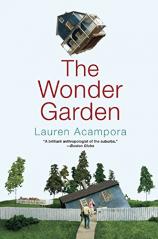The Wonder Garden
Review
The Wonder Garden
Have you ever driven through a particularly tidy suburb --- one where all the landscaping is perfect, all the facades and shutters painted neighborhood association-approved shades of beige and gray --- but no one seems to be outside those picture-perfect houses? Have you ever wondered who lives there and if their lives are as immaculate as their homes?
If you've ever asked yourself that question and secretly (or not so secretly) hoped the answer is "no," then Lauren Acampora's debut, THE WONDER GARDEN, is the book for you. Falling somewhere between a collection of short stories and a novel, it is set in the fictional town of Old Cranbury, Connecticut, a bedroom community for successful young professionals to raise their families. But it turns out (and a good thing, too, because otherwise there wouldn't be much of a story there) that behind the careful veneers these residents present to one another, there's a lot of sadness, lust and longing, and some pretty deep-seated weirdness, too.
"Although almost all of the chapters do read like well-realized short stories or character studies and could be read independently, the book is best read from beginning to end for maximum understanding and satisfaction."
If the novel were to have main characters, they would be Madeleine and her husband, David. Madeleine is expecting their first baby, and when we meet the couple, they are about to move out of the city and close on a seemingly perfect house in Old Cranbury. Narrated by their home inspector as he makes his way through their home, the first story hits on many of the book's themes about keeping up appearances, persevering through disillusionment, and finding a measure of schadenfreude in others' misfortunes. Over the course of the rest of THE WONDER GARDEN, Madeleine and David narrate their own stories, and they also show up as minor characters (as happens in a small town). So over the course of the roughly chronological stories, we see what happens to each of them, how they adapt to suburban life and, in David's case at least, change quite dramatically.
Madeleine, David and their home inspector are not the only characters in the collection --- their realtor also gets her own story, as does one member of the gay couple who eventually employ Madeleine in their home interiors shop, several members of Madeleine's book group, and a handful of others who become David's clients. For another theme of the book is the vast web of interconnections, some of them surprising, that define these characters' lives, whether they realize it or not. As readers, of course, we recognize the connections and delight in discovering them --- THE WONDER GARDEN often feels like a series of shared intimacies with the author --- so it's especially pleasant to feel as if, as an observer of this anthropological site Acampora has created, you're privy to its networks and patterns of meaning.
Not all the stories are equally successful, but most do an admirable job of standing on their own quite brilliantly while also contributing to the overall project at hand. Although almost all of the chapters do read like well-realized short stories or character studies and could be read independently, the book is best read from beginning to end for maximum understanding and satisfaction. In the end, while Acampora may not answer all the questions about what secrets lurk behind those tidy facades, her well-plotted, incisive and beautifully written fiction will encourage all of us to think about how our lives intersect with our neighbors', like it or not.
Reviewed by Norah Piehl on May 29, 2015
The Wonder Garden
- Publication Date: February 9, 2016
- Genres: Fiction
- Paperback: 368 pages
- Publisher: Grove Press
- ISBN-10: 080212481X
- ISBN-13: 9780802124814





